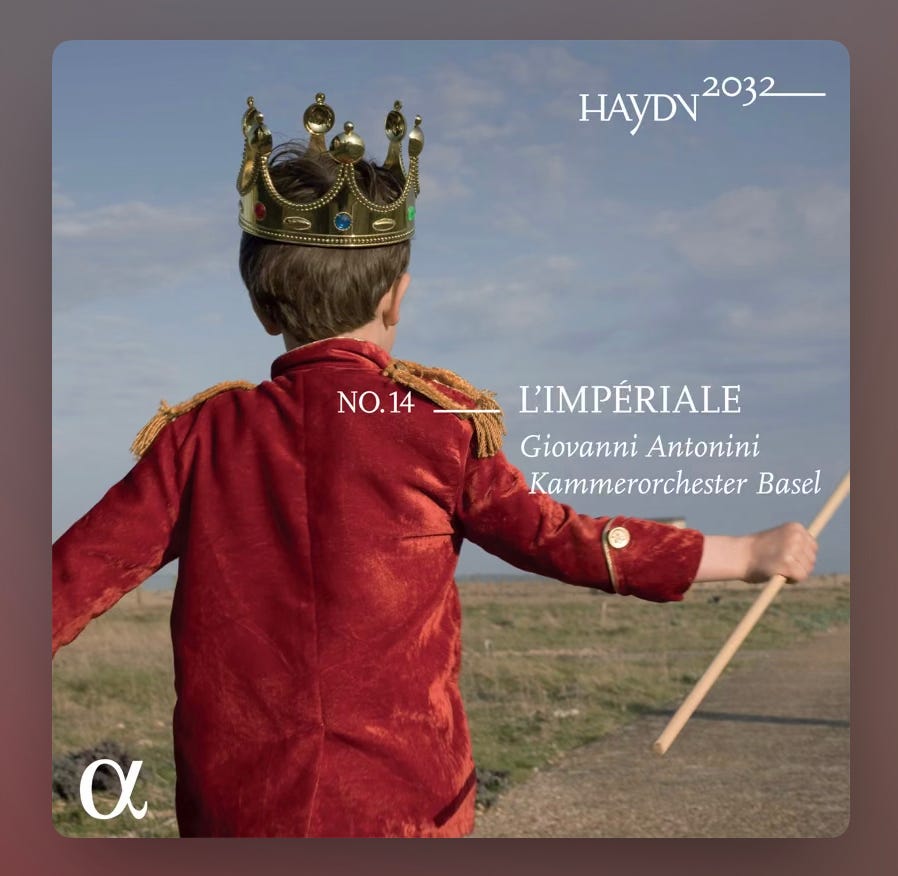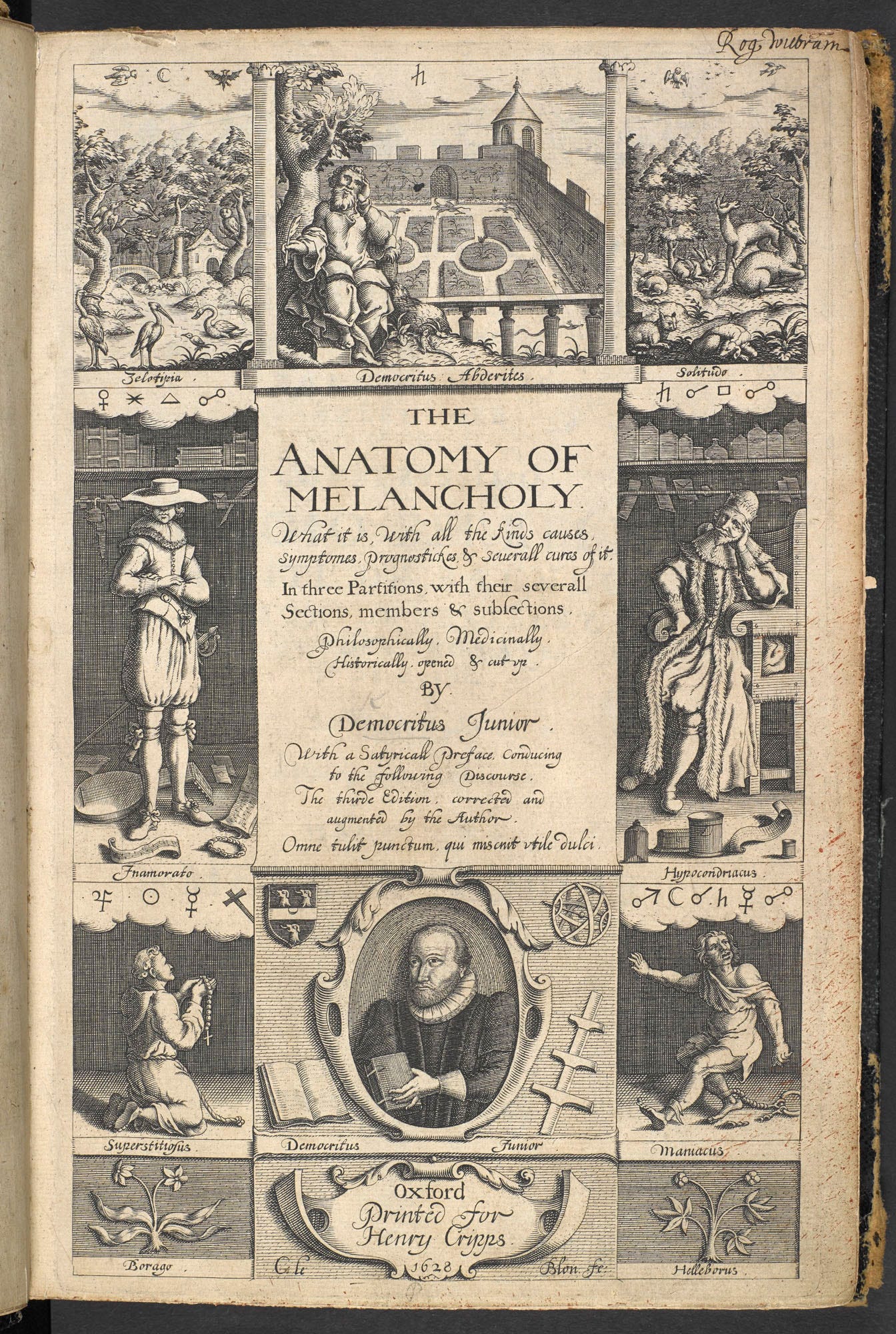🦤Bird-Bolts and Cannon-Bullets VIII
Some joy and some deep, abiding melancholy for your weekend
This is the weekly roundup of reading, listening, and other cultural items of interest. Usually, these roundups are for only paid subscribers, but through the end of September, they are going out to all subscribers to give you a sense of what you get for the price of a cappuccino per month. (The Sunday and Wednesday posts will remain free for everyone to read.) So, if you are enjoying this Friday flotsam and jetsam, then please consider upgrading your subscription.
To see more of Pier’s art, please visit pierhardinart.com.
🎶Listening
Since last week’s edition was all reading, I have a backlog of music to write about, but I’ll limit myself to two highly enthusiastic recommendations.
Giovanni Antonini and Kammerorchester Basel: Haydn 2032, Vol. 14: “L’impériale"
I know that I yammered on about Haydn’s symphonies fairly recently, but this new release is just too good not to mention. This album is the fourteenth installment of an ongoing Haydn-symphony-cycle project on the Alpha record label by the Italian conductor Giovanni Antonini, which aims to find completion in 2032, which will mark the 300th anniversary of Haydn’s birth.
If you listened to any of the Haydn recordings that I recommended a few weeks ago by the likes of Dorati, Bernstein, and Szell, well, this will be a different sonic planet. Antonini comes from the tradition of “historically-informed performance practices” (HIPP), which means a number of things: period instruments, slightly lower tuning, less (or no) vibrato in the strings, hard sticks on the timpani, smaller ensembles, and (generally) faster tempos. I could write several long posts about the HIPP movement in classical music (and I probably will in the future), but for the moment I’ll just let your ears be your guide: this sounds very different from old-fashioned, big-band Haydn. Which option you prefer is a matter of taste.
To me, the previous volumes in this series have been somewhat hit and miss. Two ensembles have been involved in the cycle: Il Giardino Armonico (which was founded by Antonini) and the Basel Chamber Orchestra. Several of the releases have sounded thin and unconvincing, lacking the punch and fullness required for Haydn’s vivacity. I think this is mostly because of the small size of the string sections, and this is an issue most often on the releases featuring Il Giardino Armonico.
In this volume, however, Antonini has the Basel Chamber Orchestra firing on all cylinders. I don’t know if the string section is much larger, but it sounds much fuller—perhaps because of the hall or the recording techniques. There is also a remarkable transparency here, which has been the case throughout this series, and you can hear every bit of the score. The album includes three mid-period symphonies by Haydn, along with a one-movement sinfonia, which amounts to a generous eighty minutes of music, all splendidly and energetically played. The volume takes its name from the 53rd Symphony in D Major, the so-called “L’impériale,” which leads off the program. While all of the performances are very good, the highlight to me is Symphony 54 in G Major, which seems to me to anticipate some of the brilliance of the late symphonies, with its grand introduction, its memorable first-subject theme, and its hairpin key changes. It’s fantastic.
Laurel Halo: Atlas

And now for something completely different. Laurel Halo is an American musician who creates electronic soundscapes, underpinned by her ethereal piano and other acoustic instruments. This sounds like no other electronic music I know, and to my ears it is closer in effect to contemporary orchestral composers like John Luther Adams and Anna Thorvaldsdottier—swirling sounds with melodic fragments, drones, and shimmering electronic strings, all of which combine into an immersive sonic experience. This is definitely music for headphones or IEMs—not your low-resolution Bluetooth speaker.
While I maintain that this does not sound like other electronic music, I certainly hear the influence of Brian Eno, but there are also traces of Ravel and Satie in the piano figures, and occasionally the more mellow side of avant-garde jazz in the searching bass lines. Though I find the review of this record on Apple Music mostly unenlightening (does AI write these things?), I do like its closing sentence: “For the most part, Atlas is a closed world, a universe unto itself, in which blurry shapes tremble in a fluid expanse of deep, abiding melancholy.” Perhaps that accounts for the blurriness of the cover photo?
Anyway, I find this great music to work to. (In fact, I’m listening to it as I type this.) But it also repays close listening. Highly recommended.
📖Reading—speaking of melancholy . . .
Robert Burton: The Anatomy of Melancholy (first published in 1628)
OK, so I’m still reading all of the books that I listed last week, and I’ll report back later on at least a couple of those. But this week I also started this book, which I have dipped into over the years but have never read cover-to-cover. It defies description: while it styles itself as a medical text, it digresses into every imaginable subject, sometimes multiple subjects in the same sentence.
While I knew Burton by reputation going back to my preparation for PhD orals in the mid-1990s, I began delving a bit more deeply a couple of years later upon reading Anthony Powell’s Books Do Furnish a Room, the tenth volume of his roman flueve, Dance to the Music of Time. Powell’s narrator, Nick Jenkins, is researching for a book on The Anatomy of Melancholy, and, well, hijinks ensue, involving, for example, a necrophilic literary critic—or is the necrophilia in the next book? They tend to run together after a while, which is partly the point. (More on Powell another time, as I have a love-hate relationship with his books, and he occupies a spot on the outer margins of my Personal Canon.)
Much later, I looked into Burton again in the context of my own research, as I became convinced that he is largely responsible for the confusion between the concepts of the “love of Hereos” [sic.] (see Ovid, Chaucer’s Knight’s Tale, etc.) and “heroic love.” (Again, more on that another time.)
So, why now? Well, for one thing, I’ve had two old, used copies of Anatomy sitting on my office bookshelves for years, and every now and then I’ve taken one of them down, opened it mostly at random, read a few sentences, and inevitably shook my head and said out loud: “What the hell?” Part of the problem with reading Burton systematically is that he tirelessly quotes Latin and Greek, sometimes voluminously, often in mid-sentence. I’m ashamed to admit it as a medievalist, but my Latin is sufficient only for about half of these quotations, and I have no Greek. So reading the book requires you to look things up constantly, and it’s an unwieldy process.
But, lo and behold, there is now an audiobook (can you believe it?) and it graciously translates all of the Latin and Greek. Now I can listen to the audiobook while I follow along in my text, and, let me tell you, it’s a long, strange trip. So after knowing The Anatomy of Melancholy by reputation for almost thirty years, I’m finally launching myself into a full reading. It will take a while.
I’m quite sure that I’ll be writing at least one full, essay-length post on this book in future, but for the moment I’ll confine myself to Burton’s extended prologue, which is a wild ride unto itself. In the prologue, Burton takes on the persona of “Democritus Junior,” after the philosopher and contemporary of Socrates—because of the ancient thinker’s wide-ranging mind and curiosity. He tells the almost certainly apocryphal story of a student coming upon Democritus sitting with a number of dissected animal carcasses, all of which he had cut open in search of the “black bile,” the reputed cause of melancholy. But, like Democritus, Burton refuses to confine himself to his titular subject:
This roving humour (though not with like success) I have ever had, and like a ranging spaniel, that barks at every bird he sees, leaving his game, I have followed all, saving that which I should [. . .] I have read many books, but to little purpose, for want of good method; I have confusedly tumbled over divers authors in our libraries, with small profit, for want of art, order, memory, judgment. I never travelled but in map or card, in which mine unconfined thoughts have freely expatiated, as having ever been especially delighted with the study of Cosmography. Saturn was lord of my geniture, culminating, &c., and Mars principal significator of manners, in partile conjunction with my ascendant; both fortunate in their houses, &c. I am not poor, I am not rich; nihil est, nihil deest, I have little, I want nothing: all my treasure is in Minerva's tower.
This actually sounds like most scholars I know, including myself, especially the bit about reading many books with “want of art, order, memory, judgment.” And if there has ever been a book that is an honest result of such a chaotic process, well, this is it. He goes on to complain that he wanted to publish his book entirely in Latin but that the publishers these days want to print books only in “vulgar English.” But of course, he gets around this restriction by including as much quoted Latin as he can get away with. He also warns us that he is not an “artful” writer but an honest one, and he is going to let his writing range everywhere that his reading leads him. The result is a sort of scholarly stream of consciousness, 300 years before Virginia Woolf.

Do I recommend Anatomy? Well, it’s probably not for most people. But if your brain is as chaotically curious as mine, then you might not be able to resist it. Again, you can expect me to return to this book at greater length in the coming months of PCF. I mean, how can I not?
Thanks for reading, from my fancy internet typewriter to yours.








You surprise and delight, John. Here's a new book I finished and so admire and that I will be writing about soon: Richard Deming's The Exquisite Loneliness. Extraordinary and brilliant. Don't scoop me though 😍 on my essay. Researching now on how to present this ...
I’m new here, is this where we talk about what we’re reading? I am going to barge into it, seeking forgiveness rather than permission, since I just finished compiling my September list (a good month). I went on a bit of a binge with satirical academia and it was a lot of fun.
Books:
Disorientation - Elaine Hsieh Chou
Japanese by Spring - Ishmael Reed
The Netanyahus: An Account of a Minor and Ultimately Even Negligible Episode in the History of a Very Famous Family - Joshua Cohen
On the subject of melancholy, I read Clancy Martin’s How Not to Kill Yourself a few months ago and recommend it with some caveats regarding the reader’s mindspace.
And on the subject of audiobooks, I read some raves of Emily Wilson’s new translation of the Iliad and got excited until I realized it’s 761 pages. I must just have read excerpts in high school. I’m considering starting with her Odyssey translation and think audio might be a good medium, plus I like Claire Danes, who reads it.